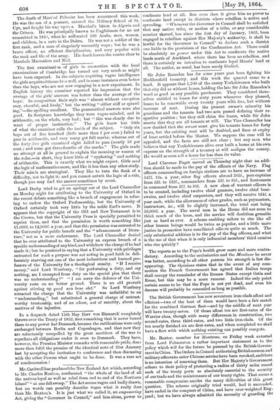The first examination of girls in connection with the local
examinations of Cambridge has turned out very much as might have been expected. In the subjects requiring vague intelligence the girls acquitted themselves well, and in some instances even better than the boys, who are not now engaging in a new experiment. In English history the examiner reported his impression that the average of the girls' answers was better than the average of the boys'. In composition their style was "almost without exception easy, cheerful, and lively," but the writing "either stiff or sprawl- ing,"—the spelling excellent. The grammatical answers were also good. In Scripture knowledge they were vague-minded, and in arithmetic, on the whole, very bad ; but "this was clearly due to want of proper instruction." The girls knew but little of what the examiner calls the inside of the subject. "Only six boys out of five hundred (little more than 1 per cent.) failed to pass in arithmetic, and very many got full marks; whereas out of the forty-five girls examined eight failed to pass (nearly 18 per cent.) and none got three-fourths of the marks." The girls made no attempt at all in general to explain the meaning or reason of the rules,—in short, they knew little of " cyphering " and nothing of arithmetic. This is exactly what we might expect. Girls need the logic of mathematics more, and like it less than any other study. Their minds are strategical. They like to turn the flank of a difficulty, not to fight it; and you cannot outwit the logic of a rule, though you may find the answer sometimes by scent.
































 Previous page
Previous page